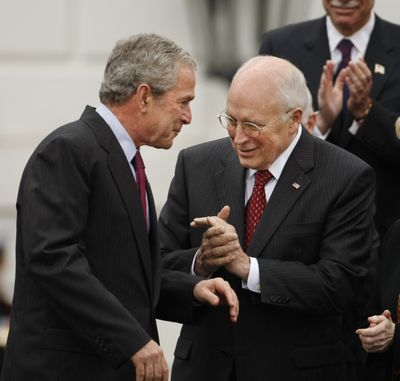So far, transition a smooth affair
White House, Obama team interaction called seamless

WASHINGTON – Faced with one of the most important transfers of presidential power in American history – amid wars on two fronts, the looming threat of terrorism at home, and a full-blown economic crisis – the outgoing Bush administration and the incoming Obama team have responded with nearly unprecedented cooperation on those issues, aides and outside experts say.
Serious decisions, and potentially divisive ones, still remain for the politically and ideologically divided camps, such as access to classified information and, in particular, battles over the regulations and executive orders that will define the policy of the two administrations.
But the days since Tuesday’s election have shown a striking level of comity following the rancor of the campaign, enhanced by President Bush’s months-long efforts to pave the way for a smooth transition and President-elect Barack Obama’s pre-election determination to move quickly.
“Ensuring that this transition is seamless is a top priority for the rest of my time in office,” Bush said in his weekly radio address Saturday. “My administration will work hard to ensure that the next president and his team can hit the ground running.”
Bush has created a transition coordinating council, populated by experts from inside and outside the administration, and has streamlined the process for obtaining security clearances for key transition officials. National Intelligence Director Mike McConnell flew to Chicago on Thursday to deliver Obama’s first daily intelligence briefing.
The Obama team has begun submitting names to the FBI for expedited security clearances, which is allowed under an intelligence reform law passed in 2004.
Bush’s chief of staff, Joshua Bolten, said the White House is even preparing a “tabletop” exercise to simulate how Obama’s national security officials should respond in the event of a terrorist attack.
“If a crisis hits on Jan. 21, they’re the ones that are going to have to deal with it,” Bolten said in an interview taped for broadcast Sunday on C-SPAN. “We need to make sure they’re as well-prepared as possible.”
Likewise, the administration is laying the groundwork for an unusual level of access to the Treasury Department and other agencies involved in attempts to stabilize the foundering economy. White House spokesman Tony Fratto said Friday that Treasury is preparing office space that will allow Obama aides to sit alongside current administration officials.
Fratto said such efforts are intended to send a signal that Treasury’s approach will not change too abruptly when Obama takes office. “They don’t want to surprise markets; they want to try to make sure that they have predictable information for markets,” he said.
Bush and Obama are scheduled to meet at the White House on Monday, after a long and tough campaign in which Obama’s chief charge was that a vote for Republican rival John McCain would be a vote for a third Bush term.
The rhetoric has cooled since Tuesday, and Bolten said the president takes it in stride when he has “had some bad stuff said about him.”
“He understands it’s a rough-and-tumble game, and he doesn’t let it interfere with his personal relationships or his judgment about what’s best for the country,” Bolten said.
Brookings Institution scholar Stephen Hess, who has been involved in presidential transitions since the Eisenhower administration, is among those who are impressed by the efforts.
“I’m not sure I’ve ever seen an outgoing administration work as hard at saying the right thing,” Hess said in an interview Friday. “This is really quite memorable.”